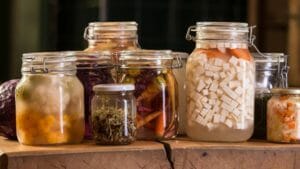The fermented foods
The life that feeds life

“At a time where for many the only way to deal with difficulties seems to be extermination and desertification, hence the sterilisation (to kill microbes), spontaneous plants are systematically eliminated (through weeding) and poisons are spread indiscriminately (disinfection in agricultural and civil fields). it is vital to recover and update the ancient tradition of fermenting food.”
Since time immemorial man has made use of the activity of microorganisms to make many foods healthier and more preservable.
Bread, wine, cold cuts, cheese, vinegar, yogurt, kefir, kombucha, miso, soy sauce, kimchi, etc.
But also various types of vegetables! In many households the ancient ritual of fermenting seasonal products to consume them at other times of the year is long lost, but today there is a slow comeback of these ancient practices.
Many of these foods are important probiotics, as they can enrich our microbiota, that is, our symbiotic community of microbes. Many of those are in fact microbes that, living in symbiosis with our organism, allow us to live in a healthy way.
Although the versatility of fermentations in the kitchen is unparalleled, there often can be difficulties in managing microbial activity. Especially today. The risks of improvised food storage should never be underestimated, even though with proper preparation many methods can be extremely simple.
La Nesler offre la possibilità di genuine and safe Live Foods.
Carlo Nesler propone anche formazione ad hoc e consulenze per professionisti di cucina, oltre a corsi di autoproduzione di fermentati per tutti.
Per saperne di più, visita la pagina corsi e workshop
To get an idea, the following brochure is available “La fermentazione delle verdure in breve”: su amazon
Also the book “Wild fermentation” by Sandor Katz is a must-have: on the publisher’s website “Il mondo della fermentazione” italian version: on editor website
“Eating means giving way to the organism to live. It is not only an energy contribution in the strict sense, but a relationship with the life around us, with our world.”